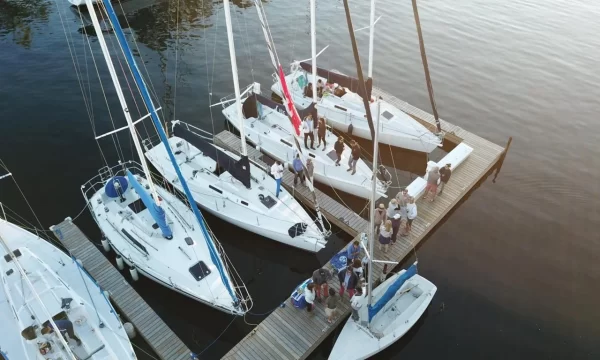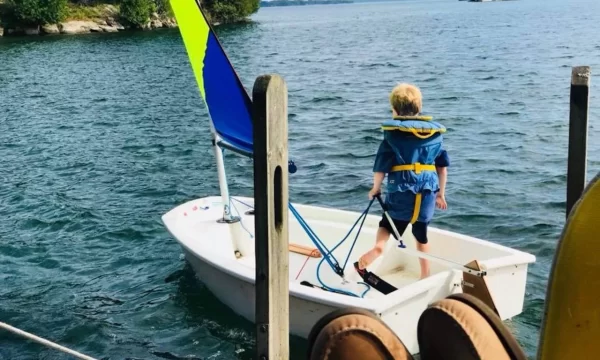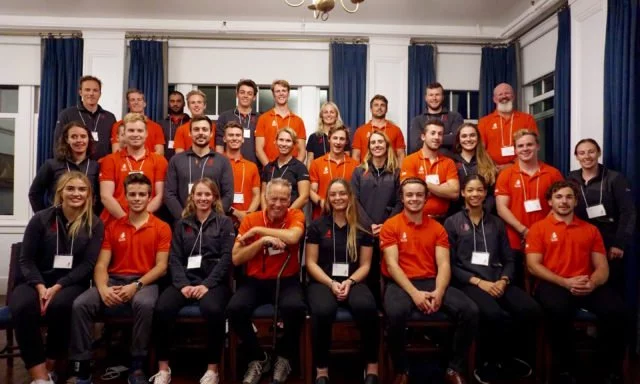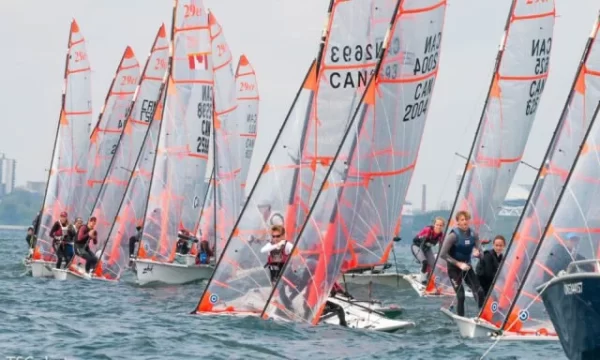LONG TERM DEVELOPMENT 3.0
Stewardship is an important and meaningful way to participate in sailing for many individuals is by giving back as teachers, volunteers, organizers, officials, judges and leaders – volunteers are key to fostering any sailing opportunity & community, and provide the necessary scaffold to support; community activities, programming for new sailors young and old, mechanisms to transition in the sport and meaningful and well supported competitive opportunities. This is critical work throughout sport and over a life time.
Participants at different ages and stages of the sport have different needs and face different challenges which have an impact on their experience and whether or not they continue in the sport. This is particularly true for adolescent participants and an important consideration for adaptive participants, women in sport, and other individuals who face barriers to participation.
Sail Canada has developed the new LTD model to help us conceptualize pathways in the sport and identify different stages of development – which consider both age, growth and skill level. This helps us understand how we can tailor our programs to best support different participants – how we design our programs to be age and stage appropriate. While these stages of development are generally defined here, it’s very important to understand these concepts as a guide, not a rule.
Programs, instructors & coaches should continuously challenge themselves get to know the groups they work with and meet participants and athletes where they are at as individuals within the wider group settings.
DEVELOPING WELCOMING & INCLUSIVE SPACES
Participating in sailing at any age in these first stages can help develop agility, confidence & independence, a sense of direction and steering through space, abstract thinking and problem solving and important team work skills. These early stages also provide an important opportunity to explore and connect with the marine environment. A positive and safe introduction to sailing can pave the way to a lifetime of playing on the water.
ACTIVE START & FUNDAMENTALS
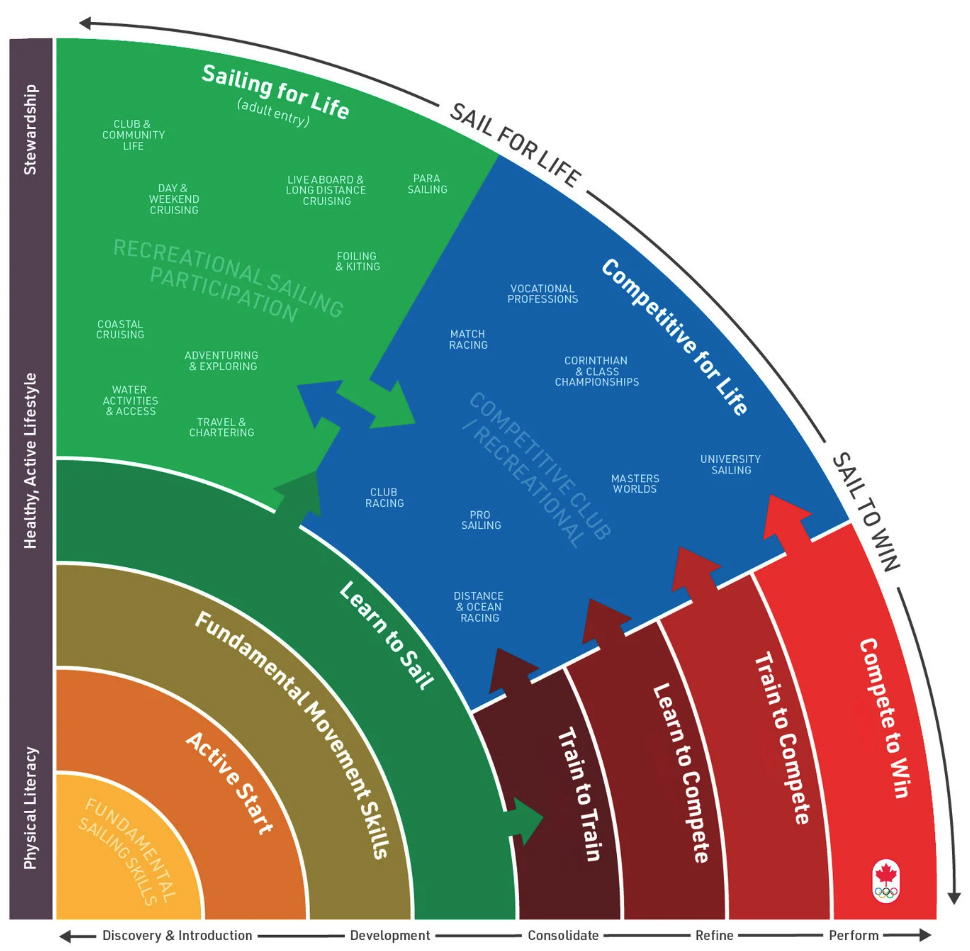 Early participation (4 to ~9 years old)
Early participation (4 to ~9 years old)
It’s important to keep a wide perspective on the development of young participants movement & sailing skills as part of well rounded overall development. In these early stages, the over arching goal isn’t that kiddos tick boxes of technical skills, it’s that they have a chance to move, make friends, and safely connect to and explore sailing and the marine environment.
Kids at this age will appreciate time to play, socialize, and explore – and short digestible sailing sessions. As participants grow and become more comfortable with the sailing environment, the learning environment can become more structured and intentional.
It may also be appropriate to introduce kids to competition at this stage – initially keep it fun, unscored, game based and focused on skill development.
Sailing Programs: Wetfeet & CANSail 1 to 4
LEARN TO SAIL
Sailing is truly a sport for life that you can join at any age. While the fundamental skills new sailors learn are consistent and transferable across any age range, our delivery should be tailored to specific contexts and participants. Regardless, great instruction and a strong understanding and focus on fundamental skills is key and sets a strong foundation for progression.
8 to ~adolescence
This is often participants entry to the sport of sailing, often through learn to sail summer programs and school programs.
Around this age, kid’s brains & bodies are exceptional at skill acquisition & building fundamental skills in a variety of sports. As well, this is a stage where kids will start to have fun putting effort into developing their skills and progressing in the sport.
Competitive programming should stay primarily club based with the potential addition of provincial and region regattas & training camps. Focus on FUN, skill development, community and the concepts of “meaningful competition” and True Sport.
Sailing Programs: CANSail 1 to 6 | Keelboat and Cruising
COACHING ADOLESCENT PARTICIPANTS
Adult entry
Along with providing appropriate opportunities for youth participants to start and progress towards their goals, it’s also important for adults to have a fun and positive introduction to sailing and the marine environment.
Adults in these first stages will bring a wide background of different experiences with them and they’ll likely be motivated learners, engaged with the process of developing tangible skills. Many may have a wider goal in sailing already in mind and will appreciate how what they’re learning on any given day relates to their goal and progression.
In general, adult participants will appreciate well structured learning environments and understanding the theoretical background of skills & concepts. While still allowing time to develop social connections and exploration, instructors and coaches should work to make sure programming is well structured and organized.
Sailing Programs: CANSail 1 to 6 | Keelboat and Cruising
SAILING FOR LIFE
This stage is largely for those with some sailing experience and includes the inevitable crossover with those pursuing the competitive pathway, Sunday sailors, weekend cruisers, circumnavigators, kiters & foilers, and anyone enjoying participating in the club & sailing community.
Sailors have many opportunities to take on exciting goals outside of competition, be it taking on a big blue water crossing, chartering and exploring new parts of the world, or taking on weekend adventures with friends and family. This space belongs to cruisers, adventurers, and embracing self reliance, exploration, connecting with nature – whether around the corner or across the globe.
COMPETITIVE FOR LIFE
This stage is largely for those with some sailing experience and includes the inevitable crossovers with those in the competitive pathway, weeknight & weekend warriors, corinthian champions, wing foil racers, masters campaigners and everyone in between.
Within this recreational space there are endless ways to explore, challenge yourself, strive to improve and be part of a team, with no end to life long learning and interesting competitive opportunities and platforms.
Being competitive should include appropriate positive recreational competitive experiences for “learn to sail” and “train to train” participants as well as positive recreational competitive experiences for adult sailors. These opportunities may all happen within one event, or may be through different events tailored to the age and stage of participants. Both opportunities should embrace the ideas around “meaningful competition” and True Sport.

